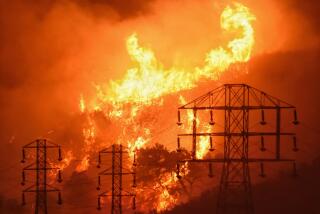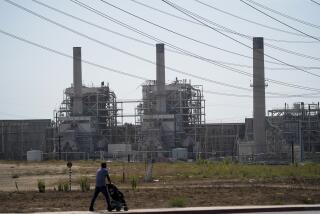President Calls for Upgrade of Power System
- Share via
WASHINGTON — President Bush on Friday described the massive multi-state electrical blackout as “a wake-up call” that should prompt Congress and his administration to forge new policies to upgrade an “old and antiquated” power transmission system.
For more than two years, legislation addressing the electricity industry’s restructuring and other energy issues has languished in Congress amid partisan and regional squabbling.
Republicans have pushed for what they call a comprehensive energy policy that would include such proposals as drilling for oil in an Alaska wildlife refuge. Most Democrats say the administration and its allies favor the energy industry over environmental concerns.
The power outage that crippled New York, Detroit, Toronto and other areas starting Thursday afternoon is likely to raise pressure on Congress to break the stalemate.
“I view it as a wake-up call,” Bush told reporters during a stop in the Santa Monica Mountains National Recreation Area. “You know, I’ve been concerned that our infrastructure, the delivery system is old and antiquated. And I think this is an indication of the fact that we need to modernize the electricity grid.”
This year, the House and Senate approved separate energy bills containing provisions meant to improve electricity distribution systems. The bills also include billions of dollars in tax incentives for energy production and conservation and various other provisions sought by the oil, gas and nuclear power industries. The Republican-led House approved its version in April, and the Republican-led Senate, in a bid to accelerate negotiations, approved a Democratic bill in July.
Talks to reconcile the bills are pending. Rep. W. J. “Billy” Tauzin (R-La.), chairman of the House Energy and Commerce Committee, said Friday that he wanted to send Bush a final bill by Thanksgiving.
But whether the blackout will spur a bipartisan compromise remains unclear. Leaders of both parties seemed quicker Friday to point fingers of blame than to cut deals. Republican congressional leaders charged that Democrats had obstructed the administration’s energy agenda.
“Passage of the energy bill is a vital national interest, and partisan Democrats stalling it should work with the House to get a realistic program to the president’s desk,” said House Majority Leader Tom DeLay (R-Texas). “Yesterday’s blackout proves the United States needs to increase its energy production and generation and improve the way we deliver electricity.”
Democrats retorted that Republicans had scuttled their efforts two years ago to provide federal loans to help improve power grids.
“President Bush and Tom DeLay put the interests of the energy companies before the interests of the American people by insisting we drill in [the Arctic National Wildlife Refuge] and other environmentally sensitive areas rather than modernize our energy system,” said House Minority Leader Nancy Pelosi (D-San Francisco).
Despite the sniping, the pending bills contain widely accepted provisions meant to promote consistent flows of electricity among and within states.
“There will be a bipartisan agreement on the need to upgrade reliability of the national electricity grid,” predicted Rep. Edward J. Markey (D-Mass.), a senior member of the energy panel.
The House bill also contains language giving the federal government a stronger hand in overcoming state and local objections to building new transmission lines. Congressional aides said the Senate bill does not include such a provision. There are also regional controversies over who would pay for new lines.
On a separate track, the Federal Energy Regulatory Commission is working with states to create a standard regulatory framework for regional transmission organizations that would oversee, manage and develop the grid. FERC’s efforts at developing a national framework for managing the grid have run into opposition from state regulators in the South and West and from some utilities.
“I am concerned about the robustness of the transmission grid,” FERC Chairman Patrick H. Wood III said. “The incentives to invest and build have to be fixed.” Wood said the elements of the House bill that make it easier to overcome objections to new transmission lines “make a lot of sense.... They are cautious but prudent provisions.”
Overall, the blackout is expected to strengthen the hand of those who argue for a stronger federal role in the oversight and management of the grid.
“This is the kind of occurrence that changes the political dynamic,” said Roger Berliner, a Washington energy lawyer. “Policymakers have known for a long time that certain things need to happen, but there has to be political will to overcome the resistance. This kind of occurrence says, ‘Hello, Houston, we’ve got a problem here.’ ”
More to Read
Get the L.A. Times Politics newsletter
Deeply reported insights into legislation, politics and policy from Sacramento, Washington and beyond. In your inbox twice per week.
You may occasionally receive promotional content from the Los Angeles Times.










